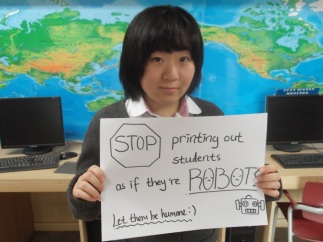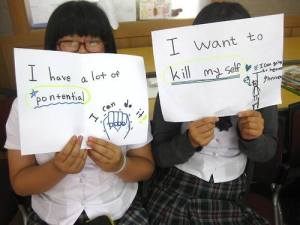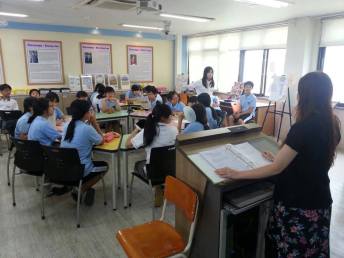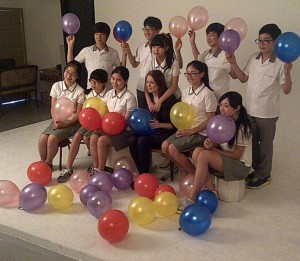
What is the point of school? To get good grades? To make friends and have fun? To teach you about life and help you to become independent? Well I think that all three things are important. Unfortunately in Korea, I have seen far too much emphasis placed on the first thing: to get good grades. Of course, it’s well known that some of the best academic results in the world come from South Korea, and Western schools could certainly learn a lesson or two from the Koreans about how to gain such success. But what the Korean Education system surely lacks is balance, and the realisation that sometimes, less is more.

Let’s have a look at an average student’s day: from 8.30 am until 4.30 pm they are in regular school (and have up to 8 classes per day with one hour for lunch). Then after school, they attend a ‘hagwon’ (a private school which 75% of students attend), which has classes until 9 or 10 pm. When do they do find time to do their homework (which is given by both regular schools and hagwons)? When they get home afterwards. The result: students overworked and falling asleep in class, stressed about their workload and therefore not working to their full potential.
“We’re too tired when we study in hagwons”.
“We’re too sleepy too study well”.
“Hagwon homework causes students lots of stress”.
These are things which my students wrote when asked what they think of the education system. Sure, children can go to school from 8 am to 10 pm every day, but is it beneficial if for the majority of that time they aren’t concentrating because they’re too tired or worried about the homework they haven’t had time to finish? Every day I have students falling asleep, or sneakily trying to complete their hagwon homework in my class. Quite often when I ask them what time they went to bed, the answer will be somewhere in the early hours of the morning.
Even worse is when they have vacation and the majority of students simply go to summer/winter camp, spend extra time studying and still go to their hagwon every day. As a result they get no proper break during the school year. My standard response when I ask them what they did on their vacation? “Study”. And did they enjoy their vacation? “No”. I can honestly say that this is what 90% of my students say.

More worrying than anything else though, is the ease with which students talk about stress, depression and suicide. I have known children as young as 7 years old talking about how depressed they are when they have tests, crying at how their parents will react to their scores and terrified at the prospect of a report card. According to Korea Real Time, a recent survey showed that half of South Korean teenagers had suicidal thoughts, and one in three called themselves depressed. (http://blogs.wsj.com/korearealtime/2014/03/20/poll-shows-half-of-korean-teenagers-have-suicidal-thoughts/)
Of course, on paper the education system is a success; Korea has continually high test scores and one of the highest percentages of teenagers who continue onto university. No one can dispute the merits of such a system, and it’s true that even the least-motivated and worst-behaved students study hard when it comes to their exams. But what they need is more balance, so that they are more focused and willing to work hard during the entire academic year. It’s true that students may benefit from a couple of extra lessons outside of school if they’re struggling in a specific subject, but going to hagwons for hours every night only makes them exhausted and stressed.
Something which confirms this to me is seeing the best students in our school. By ‘best’ I don’t just mean best in terms of exam scores, I mean the most active students, the happiest, the most engaged and enthusiastic in lessons. These students are invariably the ones who aren’t pushed into ridiculously long hours. Sure, they might go to a hagwon, but not every day and not for so many hours. The result? Brighter students who not only perform better in lessons, but enjoy school because they’re not too tired to focus.
“There is no time to do our hobbies”.
I mentioned before that what the system desperately needs is more balance, and my student’s complaint above reiterates this. Sure, it is important to work hard and achieve good grades, but it’s also important to have hobbies when you’re growing up. Whether it’s music, sports, reading, etc, children should be encouraged to live well-rounded lives. And most importantly, to have independence which sadly, the majority of students lack. Why? Because the focus of their teaching is entirely on getting good grades, being spoon fed to achieve a high score on the all-important mid term exams. Ask a student an academic question, you’ll get the answer in a heartbeat. Ask a student for their opinion and it’s much more difficult for them to give you an answer.
I don’t want to come across as completely against Korean education, because as I said at the start, it evidently has its benefits. I am impressed that students even make it through their 12 hour (or more) days. Even better, 99% of students, even if they don’t show it in class, openly acknowledge and appreciate the importance of school and a good education.
What I think needs to change is the attitude that exams are the be-all and end-all. Not all students are academically gifted, that is a fact not only in Korea but around the world, and those students should be encouraged to excel in other fields, not waste their time in a classroom feeling ever-more helpless and stressed.
Even more importantly, the students should be taught independent thinking; what’s the use of getting into a prestigious university if you can’t cope with looking after yourself and making your own decisions when you’re there?
So what’s the ideal? An education system which pushes you to do your best, of course. But be realistic; doing your best is not working for 12 hours a day with only 50% effort. Doing your best is working for half that time, but with 100% effort. And most importantly, as system in which children feel happy.

